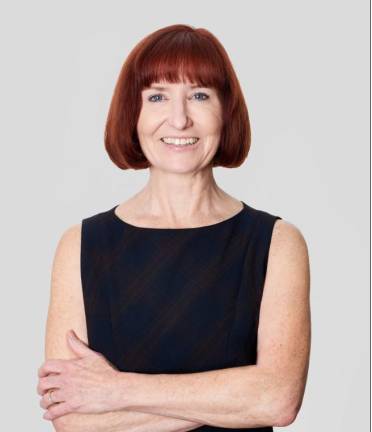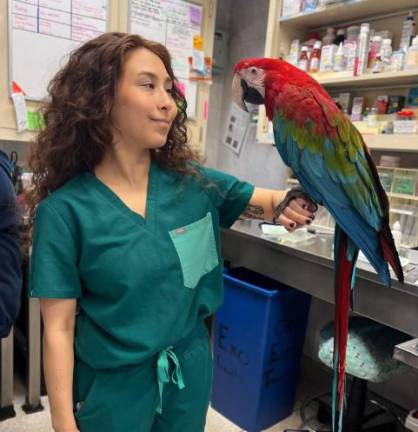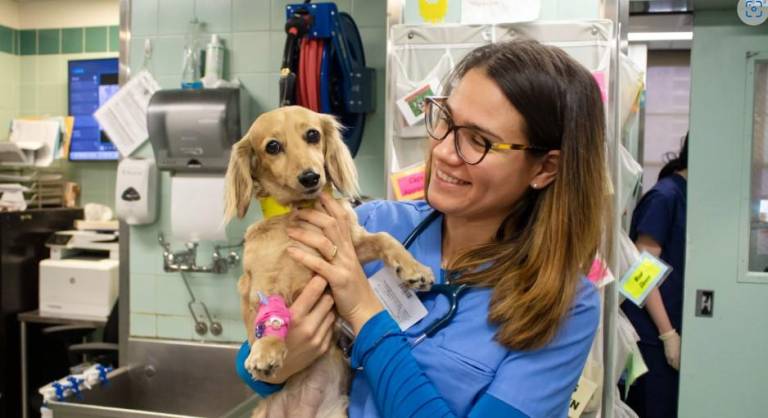Taking Care of Beloved Pets At City’s Only Level 1 Trauma Center for Animals
A career in cardiac career nursing led to an 11 year stint as the CEO of an organ transplant Institute. Looking for a career change when she retired, she began working with animals. Now she’s the CEO of Schwarzman Animal Medical Center, the city’s only Level 1 Animal Trauma Center.



It’s all paws on deck for Helen Irving, who is very hands-on in her role as the president and CEO of the Schwarzman Animal Medical Center.
“I always take time though to go down to the units and be a part of the team,” said Irving, who is also a registered nurse. “So I’m known for putting on a set of scrubs and going into the OR. And I will hang out in my emergency room overnight so that I could see for myself what the needs are.”
The native of London, who now lives on the Upper West Side, just celebrated her one-year anniversary at AMC, the world’s largest non-profit animal hospital, located on the Upper East Side.
Irving, whose impressive resume includes serving as vice president of hospital operations at Mount Sinai Medical Center and transplant operations manager at New York-Presbyterian Hospital, explained the atmosphere at AMC as one of a pediatric hospital.
“The reason why I say that is that our patients can’t talk to us, very much like children. They can’t tell us what’s wrong all the time and our pets can’t tell us, you just know they’re in pain,” she explained. “So when we’re dealing with children, we’re usually working with parents and our clients are parents of their animals. They tell us that all the time, ‘This is my baby.’”
AMC, which just unveiled its Denise and Michael Kellen Institute for Surgical Care, part of its $125 million-dollar expansion, also works closely with the NYPD and FDNY to provide care for their K9 officers as well as zoos in the tri-state area, to help their furry friends. It employs over 130 veterinarians in over 20 specialties, and last year alone, had 54,417 pet visits including over 2,800 for surgery.
And the center, which is opened seven days a week, doesn’t just tend to dogs and cats.
“We have lots of bunnies, parrots and bearded dragons,” said Irving, who herself has a 17-year-old rescue cat called Fidget and a 9-year-old Welsh Terrier named Reggie Jack.
“And we see quite a few gerbils and hamsters and guinea pigs. We recently had a therapy duck in who needed surgery on his webbed feet.”
Tell us about your professional background and work as a nurse.
I went to nursing school in the U.K. and specialized in cardiology, so I am a certified cardiac nurse. And then once I moved over to Canada and New York, I was working in cardiothoracic critical care. Then, I moved over to the organ donation program in New York City and most of my career since then was in transplantation or organ donation, having worked in both areas and Columbia University when it was New York-Presbyterian Hospital and then also at Mount Sinai. At Sinai, I was the director for clinical transplantations for the heart, lung, liver, kidney, small valve program. It’s known as the Recanati/Miller Transplantation Institute and from there, I was promoted to vice president of hospital operations. At the end of my time there, I ended up going back to the organ donation program as the CEO for almost 11 years. I worked through COVID and really felt that I needed a change in my career. I thought I’d done as much as I could in the organ donation space and I actually officially retired from that role.
What led you to your role at AMC?
I was doing some volunteer work and working temporarily over in Hackensack when out of the blue, I was called by the same recruiting agency that placed me in my last job, asking if I’d be interested in the Animal Medical Center. My first reaction was, “I think you’re mistaken. Have you read my resume? I am not a veterinarian.” They said, “Actually, the board much prefers to find people who could run a hospital. Because, obviously, veterinarians will take excellent care of the pets, but we need someone who can manage the hospital itself.”
How can you explain the hospital.
It is a real hospital. I tell people, “It’s just like walking into a Mount Sinai.” There’s CT scans, MRIs, operating rooms. There’s a linear accelerator, oncology services, cardiac services. It’s no different. The other thing I would liken it to, it’s not like an adult hospital at all, it’s much more like a pediatric hospital. From a hospital administration’s perspective, the equipment’s smaller; everything is pint-sized, unless we’re dealing with a Great Dane, then obviously they’re bigger than me.
What is a typical day like for you in your role?
It’s never the same. One day, I was meeting with legal counsel, because we were going through a real estate transaction. So I went downtown. I came back and at lunchtime, one of my doctors called me up and said, “Helen, can you come to the operating room? We have an interesting case for you to look at.” So I went flying down, I put on my scrubs, and went to the OR. And then I had to leave work a little early for a doctor’s appointment. I walked out of the AMC, it was 4 o’clock in the afternoon, and there was a gentleman in a parked car across the street screaming for assistance. I grabbed my guys and ran across the road and there, sure enough, is a Pit Bull having babies in the back of the car.
Are there really 1.1 million pets in the city?
Yes, actually Forbes did a really good analysis around animals. I think it’s something like 70 percent of homes now have an animal, but 66 percent of them were acquired during COVID. So the ownership of pets in our lives has just exploded. And if you remember during COVID, we saw that the shelters were empty because people wanted company in their one-bedroom apartments on their own. So right now, there’s a huge demand for veterinary services across the board, from wellness to preventative medicine to vaccinations to what we do, which is the tertiary care.
Tell us about some of your animal patients.
We have a very strong relationship with the NYPD and the FDNY in that we care for all of those animals, from the corrections office department to FDNY and bomb-sniffing dogs, all of those dogs come to us for their checkups. We typically have one of them at AMC every single day. They are absolutely working dogs; they are amazing animals to care for and we’re very proud of that relationship. When you get the dogs that sniff out all the bombs, the contraband and the drugs, those typically are your Springers and your Labs, smaller dogs. And of course, it’s a game for them, so they’re hyper; they’re all over the place. And then you’ve got the real regal police K-9s who just sit and are very attentive.
We do a lot of minimally invasive surgery. People want for their pets just as you would if you were a human because there’s less of a scar and the recovery time is faster. One of the dogs that was there was born with paws that were faced the wrong way. So you’re able to create a guide which is like a small plate that holds the paw straight and you actually go back in and move the paws around to make them straight. We do a lot of interventional radiology cases as well. Just as you would in human healthcare, you can put a stent in a coronary artery to prevent a heart attack. We do that in dogs too. There’s lots of different things that go on at AMC that are comparable to what happens in a hospital.
For more information, visit www.amcny.org